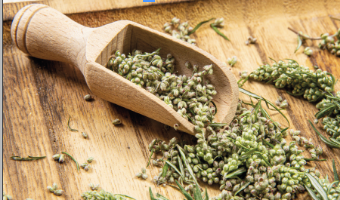Artemisia vulgaris, commonly known as mugwort, is considered a weed, as it grows quickly and tends to be quite invasive to landscaping. Mugwort is a flowering perennial plant that has a history of growing natively in Africa, Asia, and throughout Europe, although today you may find it in other warm parts of the world including in North America.
In folk medicine, the arial parts of the plant, including the leaves, stems, and blossoms, are used in making extracts, tinctures, teas, tonics, and essential oils, as well as topical remedies, in the form of salves and lotions.
Fast facts about mugwort:
- Artemisia vulgaris L. (common mugwort) was called the “mother of herbs” in the Middle Ages (1).
- The European Pharmacopoeia has listed mugwort as a potential homeopathic raw material (1).
- This species has been used in traditional Chinese, Hindu, and European medicine to regulate the functioning of the gastrointestinal system and addresses various gynecological concerns (1).
A historical use of mugwort involves a technique called moxibustion, in which a paractitioner burns the herb over a specific part of the body. Practitioners commonly use moxibustion during acupuncture to increase the effectiveness of this practice. One 2017 review found sufficient evidence to suggest that moxibustion is effective for pain reduction and symptom management in people with osteoarthritis in the knee (2).
There has been research, although limited, on mugwort for skin rashes, irritation, and scars. It has been tried on atopic skin conditions including eczema and psoriasis with varied results. The best result was achieved when mugwort was mixed in a lotion with other ingredients including peppermint oil.
Orally, mugwort has been taken in the form of tincture, elixir, or tea for digestive support.
Caution: Mugwort contains a substance called thujone, which can be toxic in large amounts. The amount in the herb itself is small enough that experts generally consider it safe to use, though it is likely not safe if pregnant, and there is little research on use during breastfeeding, so avoidance is advised. It is not recommended for children. It is in the ragweed family, so those that may have ragweed allergies may also have an allergy to mugwort. As always, one should consult a healthcare provider when adding new products to their wellness routine.
References:
- National Library of Science-Pub Med Central, October 2020. Significance of Artemisia Vulgaris L. (Common Mug wort) In the History of Medicine and it’s Possible Contemporary Applications Substantiated by Phytochemical and Pharmacological Studies. PMCID: PMC7583039. PMID:32992959
- National Library of Science-Pub Med Central, June 2017. Moxibustion for the treatment of osteoarthritis: An updated systematic Review and meta-analysis. PMID: 28539175










